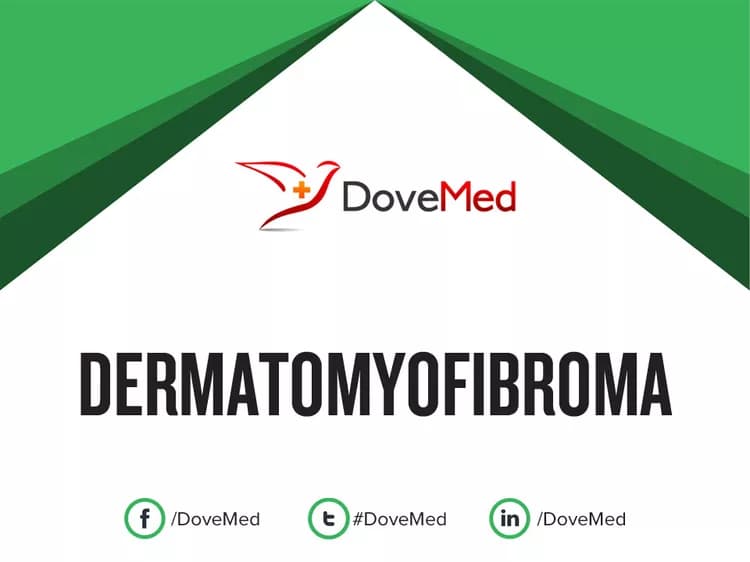What are the other Names for this Condition? (Also known as/Synonyms)
- Plaque-like Dermal Fibromatosis
What is Dermatomyofibroma? (Definition/Background Information)
- Dermatomyofibroma is a rare, benign tumor of skin that generally affects young women
- It is a painless tumor that commonly occurs on the chest, back, and head and neck region
- A complete surgical excision of Dermatomyofibroma is considered curative
- The prognosis of the skin tumor is excellent with its surgical removal
Who gets Dermatomyofibroma? (Age and Sex Distribution)
- Young women (average age 30 years) are predominantly affected by Dermatomyofibromas; the condition is infrequent in older individuals
- Though males and females are affected; females are affected with a higher frequency
- Individuals of all racial and ethnic background can be affected. Worldwide, no geographical localization of Dermatomyofibroma has been reported
What are the Risk Factors for Dermatomyofibroma? (Predisposing Factors)
- Currently, no risk factors have been identified for Dermatomyofibroma benign skin tumor
It is important to note that having a risk factor does not mean that one will get the condition. A risk factor increases one’s chances of getting a condition compared to an individual without the risk factors. Some risk factors are more important than others.
Also, not having a risk factor does not mean that an individual will not get the condition. It is always important to discuss the effect of risk factors with your healthcare provider.
What are the Causes of Dermatomyofibroma? (Etiology)
Currently, no definitive causal factors are reported for the development of Dermatomyofibroma.
What are the Signs and Symptoms of Dermatomyofibroma?
The signs and symptoms of Dermatomyofibroma include:
- Dermatomyofibroma is seen as a benign nodule on the skin. The skin over the tumor may appear reddish-brown
- The most common sites include the skin of the chest, back, axillary region, and head and neck areas. Dermatomyofibroma is rarely observed in the arms and legs
- Usually, a single skin nodule is observed; however, in rare cases, multiple nodules have been reported
- The nodules are normally painless and slow-growing. The masses are usually firm to touch and well-defined
- Majority of the tumors are less than 2 cm in size, however some may grow to greater sizes
- Large tumors may occasionally ulcerate the overlying skin, which may result in skin infections
How is Dermatomyofibroma Diagnosed?
A diagnosis of Dermatomyofibroma may involve the following:
- A thorough physical examination with medical history
- Assessment of the presenting signs and symptoms
- A biopsy of the mass, which is examined by a pathologist under a microscope. The pathological examination is considered to be a gold standard, and will help in a definitive diagnosis
Many clinical conditions may have similar signs and symptoms. Your healthcare provider may perform additional tests to rule out other clinical conditions to arrive at a definitive diagnosis.
What are the possible Complications of Dermatomyofibroma?
Complications (if any) arising from Dermatomyofibroma are rare.
- Occasionally, the tumor may become large in size, resulting in a cosmetic issue
- In some cases, skin infections due to ulceration of large tumors may be seen
How is Dermatomyofibroma Treated?
- Dermatomyofibroma tumor is benign in nature. A surgical excision of the tumor is considered sufficient treatment and is curative
- Also, the tumor does not recur on a complete surgical removal
How can Dermatomyofibroma be Prevented?
Currently, there are no known methods to prevent Dermatomyofibroma, a rare benign skin tumor.
What is the Prognosis of Dermatomyofibroma? (Outcomes/Resolutions)
The prognosis for Dermatomyofibroma is excellent on a complete surgical excision, since it is a benign tumor.
Additional and Relevant Useful Information for Dermatomyofibroma:
The pathologist may utilize immunostains in order to arrive at a definitive diagnosis.
- The Dermatomyofibroma tumor cells are usually positive for actin and smooth muscle actin
The tumor cells are negative for CD34, CD57, CD68, HMB 45, desmin, and pancytokeratin immunostains
Related Articles
Test Your Knowledge
Asked by users
Related Centers
Related Specialties
Related Physicians
Related Procedures
Related Resources
Join DoveHubs
and connect with fellow professionals



0 Comments
Please log in to post a comment.